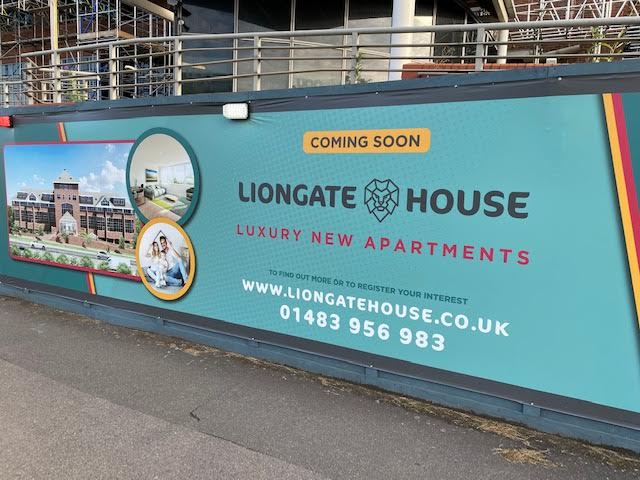 Abraham Lincoln
If given the truth, the people can be depended upon to meet any national crisis...
Abraham Lincoln
If given the truth, the people can be depended upon to meet any national crisis...
 Guildford news...
for Guildford people, brought to you by Guildford reporters - Guildford's own news service
Guildford news...
for Guildford people, brought to you by Guildford reporters - Guildford's own news service
Investigation Concludes GBC Not At Fault Over Multi-million Liongate Building Sale
Published on: 14 Jul, 2022
Updated on: 16 Jul, 2022

Computer-generated graphic of how the finished building will look. Image Elevation Estate Agents
By Martin Giles
An investigation by the Royal Institution of Chartered Surveyors into complaints that the sale of a landmark office building in Guildford was mishandled by Guildford Borough Council has found no evidence to uphold it and recommended that “the case be closed with no further action”.
The complaints were made by Cllr David Bilbe (Con, Normandy) and former Conservative councillor Geoff Davis, a chartered surveyor with long experience of Guildford property transactions. In his email raising his complaint, he summarised his grounds as:
- I simply cannot understand why the property was not kept and switched into the desperately needed housing stock – such a simple move.
- The property was marketed in a great rush, before the permitted development rights [that allowed the office block to be changed to residential use] were established, losing the council a significant value uplift.
- Even worse, there was apparently no “overage clause” in the contract, so the council could share any value increase if further units were obtained. That was particularly negligent, as the purchasers achieved an extra 18 units very readily as soon as they had purchased.
But several of those who spoke at GBC’s Overview & Scrutiny Committee on Tuesday (July 12) to defend the council’s decision, in particular Cllr John Rigg (R4GV, Holy Trinity), another experienced chartered surveyor, said that the really poor decision had been the acquisition of the property in December 2013, during an earlier Conservative administration, for £13 million.
He asked Mr Davis: “Would you agree that the original purchase was a disaster… an office investment 20 years old, with only five years left on the [tenancy] lease [before a break clause] and needing, at the end of that period, a complete refurbishment,” which Cllr Rigg said could have cost as much as the purchase price.
Mr Davis responded: “Whether it was a good or bad purchase, I don’t know… Quite clearly the risk of the break [clause] was factored in.
“So I wouldn’t have bought it with that under such a short-term lease. And I doubt whether you would or recommended anybody else that we were dealing with to do it. What saved the day though, was the change in the planning to permitted development rights.”
Cllr Rigg agreed. The change in the rules, in the wake of decreased demand for office space caused by increased home working and the associated rationalisation of office space by companies coupled with the shortage of housing, made it much easier for offices to be converted to dwellings. It was this change that the complainants felt GBC failed to exploit, on behalf of taxpayers, by failing to obtain a higher price for the Liongate property when it was sold.
Some years before, in 2018, when the break clause had been put into effect GBC officers became anxious to divest themselves of the property which they feared would become a liability. Options to convert to housing, including social housing, were examined but considered unviable, partly because of the position of the property by a major road junction with poor air quality.
In March 2020 GBC sold Liongate for £10.1 million, nearly £3 million less than it had paid for it although it had received a gross income of £5.9 million over the period of ownership and achieved an internal rate of return on its investment of 4.2 per cent. Cllr Rigg observed that luckily the investment had, overall, “washed its face”.
Mr Davis said that he had recently visited Liongate where show properties were now open to view by potential purchasers. A selling agent said that three-quarters of the 94 apartment properties were already under offer, a claim he admitted he took with a pinch of salt, but by not exploiting the relaxation of permitted development rules he felt that the council missed the opportunity to have sold the property for a higher price increasing the gross development value by several £million.
Tim Anderson the current lead councillor responsible for resources said at the outset of the debate that he felt the complaints had been politically motivated by the Conservative group.
Later, summing up at the end of the debate he said, referring to the complaints: “So much of this is just speculation, but the report isn’t speculation. It’s crystal clear… it went to the highest bidder. The auditor has said everything was done correctly. RICS has said everything was done correctly.
“I’ve got a massive portfolio… Having to read all this report is not a good use of my time. I should be doing much more constructive things. We should draw a line under this and move on.”
Cllr Paul Spooner (Con, South Ash & Tongham) responded: “You won’t be surprised as Overview & Scrutiny chairman that I slightly disagree on the fact that scrutiny is a pain for officers and takes up too much time [but] it is a necessary part and process of democracy.”
Recent Articles
- Guildford Institute’s Crowdfunding Project for Accessible Toilet in its New Community and Wellbeing Centre
- Letter: Guildford – Another Opportunity Missed?
- Letter: GBC’s Corporate Strategy – Where Is the Ambition?
- My Memories of John Mayall at a Ground-breaking Gig in Guildford Nearly Six Decades Ago
- Westborough HMO Plans ‘Losing the Heart of the Street’ Says Resident
- College Invests to Boost Surrey’s Economy and Close Digital Skills Gap
- Community Lottery Brings Big Wins for Local Charities
- GBC Housing Plan Promises ‘A Vibrant Urban Neighbourhood’ Near Town Centre
- Hospital Pillows ‘Shortage’ at the Royal Surrey
- Updated: Caravans Set Up Camp at Ash Manor School


Search in Site
Media Gallery
Dragon Interview: Local Artist Leaves Her Mark At One of England’s Most Historic Buildings
January 21, 2023 / No Comment / Read MoreDragon Interview: Lib Dem Planning Chair: ‘Current Policy Doesn’t Work for Local People’
January 19, 2023 / No Comment / Read MoreA3 Tunnel in Guildford ‘Necessary’ for New Homes, Says Guildford’s MP
January 10, 2023 / No Comment / Read More‘Madness’ for London Road Scheme to Go Ahead Against ‘Huge Opposition’, Says SCC Leader
January 6, 2023 / No Comment / Read MoreCouncillor’s Son Starts Campaign for More Consultation on North Street Plan
December 30, 2022 / No Comment / Read MoreCounty Council Climbs Down Over London Road Works – Further ‘Engagement’ Period Announced
December 14, 2022 / No Comment / Read MoreDragon Interview: GBC Reaction to the Government’s Expected Decision to Relax Housing Targets
December 7, 2022 / No Comment / Read MoreHow Can Our Town Centre Businesses Recover? Watch the Shop Front Debate
May 18, 2020 / No Comment / Read More















Recent Comments